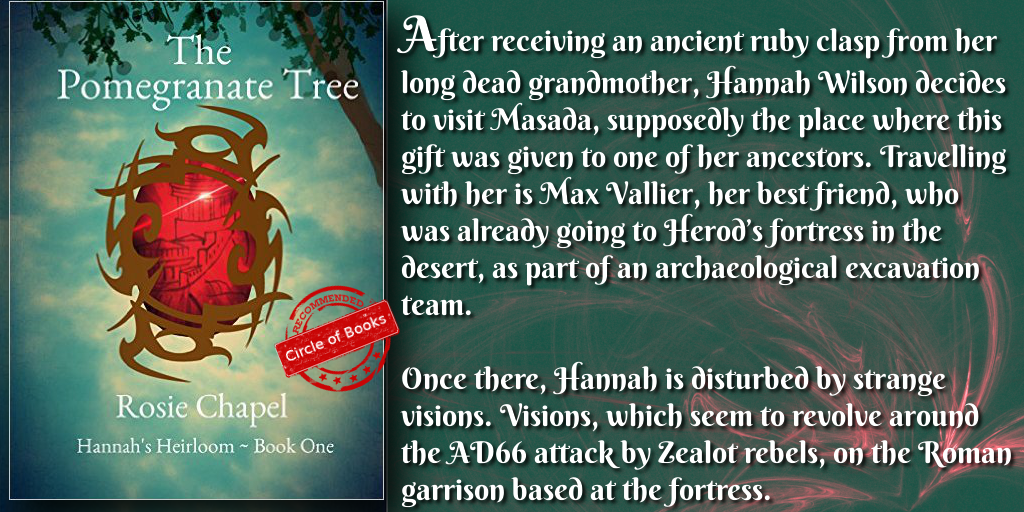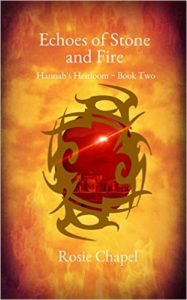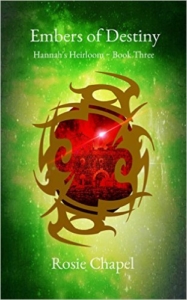The Pomegranate Tree is the first book of the historical romance series Hannah’s Heirloom by Rosie Chapel
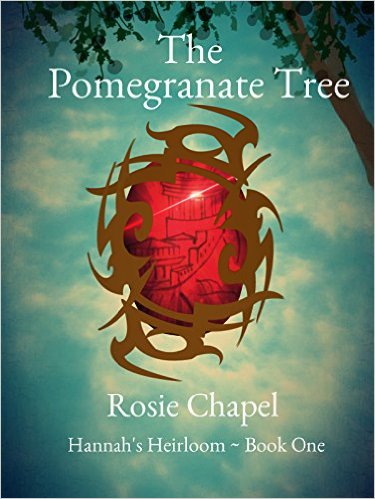
Know More
After receiving an ancient ruby clasp from her long dead grandmother, Hannah Wilson decides to visit Masada, supposedly the place where this gift was given to one of her ancestors. Travelling with her is Max Vallier, her best friend, who was already going to Herod’s fortress in the desert, as part of an archaeological excavation team.
Once there, Hannah is disturbed by strange visions. Visions, which seem to revolve around the AD66 attack by Zealot rebels, on the Roman garrison based at the fortress.
As her two worlds begin to entwine, Hannah realises that she is experiencing the events of the past as they unfold, events, that so far she has only dreamed about. Pulled into the ancient world, she tends to three Roman soldiers who survived the attack, but who are now captives. Back in the modern world, she finds artefacts that tie her to her ancient counterpart. Meanwhile, her relationship with Max takes an interesting turn, but just as they admit their feelings for each other, a tragic accident tears them apart.
Fate intervenes and Hannah slips into the world of Ancient Masada. There, away from all modern trappings, she must rely on her wits and instincts to deal with the challenges of her alternate life. A life in which she, an unmarried Hebrew woman, is a healer – a trained physician fighting to keep alive the men under her care. This life becomes more complicated as she realises she is falling in love with one of the Roman soldiers, a love that could have deadly consequences.
Unsure whether she will ever be able to return to the modern world, Hannah accepts her destiny, rising to the challenges of living on an isolated fortress and, believing that she has a chance to save those she loves by using the knowledge she has brought with her from two thousand years in the future. The knowledge that, eventually, Jerusalem will fall and, that those escaping the city will make their way to this outpost, followed by an avenging Roman army intent on destruction.
Will Hannah escape? Will she ever see Max again, or is she doomed to die along with hundreds of others as Masada falls – and what does any of this have to do with an ancient ruby clasp?
A Word from the Author
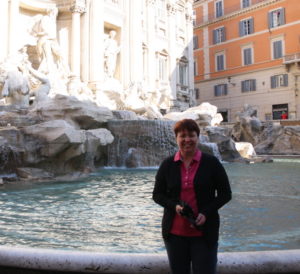 Ancient history in all its forms has always fascinated me and not very long ago, I was persuaded to return to University so that I could immerse myself in it, rather than remain an armchair historian. I was lucky enough to choose a Roman history unit with a lecturer whose passion for her subject was infectious. Before long I was completely spellbound by the Julio-Claudians and their successors throughout the first century AD.
Ancient history in all its forms has always fascinated me and not very long ago, I was persuaded to return to University so that I could immerse myself in it, rather than remain an armchair historian. I was lucky enough to choose a Roman history unit with a lecturer whose passion for her subject was infectious. Before long I was completely spellbound by the Julio-Claudians and their successors throughout the first century AD.
I had no intention of leaving Uni, wanting to continue along the academic path but something shifted during the last semester of my undergraduate degree, so I decided to take a break and see where the wind blew. It was at this point my husband suggested that I might like to write a book set in antiquity, putting my love for history to a different use. Although the idea appealed to me — writing a book has long been a dream of mine — I didn’t think I had it in me and wasn’t I too old anyway? Even if I decided to give it a go, what would I write about? How did I come up with an original storyline?
I let the concept play around in my head for a while, jotting down possibilities, ranging from the sublime to the ridiculous. Then one day, I came across one of my assignments on the ancient port city of Caesarea Maritima, the background to which, covered information on King Herod’s entire building program including his restructuring of an isolated citadel in the Judaean desert. A spark flickered into life; this was the fortress at Masada, where in the first century AD there had been a rebel ambush, a massacre and a vengeful Roman army. All great scenarios around which I could base a story, could I make something of this?
Devouring every piece of information I could find on the history of this fortress and the archaeological excavations, the spark became a little brighter and an idea started percolating, one that intrigued me, but one I struggled to pin down. Then I remembered that according to an ancient source, seven people — two women and five children — had survived the massacre, and inspiration hit. One of these women could be my heroine; I just needed to work it backwards to determine how on earth she avoided being slain. Then, I added a further complication, deciding to include a modern heroine, related to the women who survived and that somehow they connected across time. Not time travel in the accepted sense, she wouldn’t actually disappear from her own world, but her soul would meld with that of her ancestor. She would see events as the unfolded and could use her knowledge of what would happen to save those she loved.
While researching Masada, I came across an article about some skeletal remains that had been discovered under a pile of debris on the lower tier of the Hanging Palace. Initially assumed to be one of the Zealots, further examination has suggested that it may well have been one of the Roman soldiers killed in the ambush of AD66. Interested, I started to play with the notion that one or two soldiers might have survived the rebel attack. Wounded, but rather than killed, they were treated and once healed, held as captives to be used as bargaining tools should the need arise. All well and good, but how were they cared for? Who would treat their injuries? These men were an enemy; the Zealots would more likely prefer to finish them off.
Enter my ancient heroine. Choosing to call her Hannah, meaning ‘favour’ or ‘grace,’ I decided that she would not be a typical Hebrew woman. Brought to Masada by her brother, Hannah was a young, single woman, trained in the art of healing by an indulgent uncle, himself a physician. Holding a unique status in the burgeoning community at the fortress, she would be central to the survival of the Roman soldiers.
The Pomegranate Tree was born. A strange title I know, but I decided to call it this for several reasons. Firstly, it seems that pomegranate trees can grow in the most arid of places and against all the odds often survive even the harshest weather. My story revolves around two couples who found each other in the most unexpected place, fall in love and against all odds survive. Secondly, an early excavation team planted pomegranates during a Jewish New Year festival and apparently the bushes flourished. Thirdly, it confirmed Josephus’ claim that the citadel was capable of supporting all manner of growing things — I do like it when an ancient source is proven correct. Finally although pomegranates are quite scrubby trees, their fruit is delectable and I liked that a rather coarse tree could produce such flawless fruit. This synthesis reflected the characters of Maxentius and Hannah. A battle hardened and, now captive, Roman soldier meets a petite and beautiful Hebrew woman, trained in the art of healing. By rights they should be sworn enemies, yet they complement each other perfectly.
So far so good! Now I had to work out why my modern heroine, also called Hannah, would want to visit Masada. She receives a ruby clasp, a surprise birthday present from her long dead grandmother and the accompanying letter tells her that it was a gift from a grateful solider at Masada. Hannah decided to try and trace its origins and by sheer coincidence (hmm) her best friend, male — of course — is already going to the fortress as part of the season’s current archaeological excavation. Now we needed the magic, something that would connect these two women, merging them into one, without either of them physically travelling through time — I did say I wanted it to be credible!
Right then — how about this — the best friend who has travelled with her, believes that what Hannah is experiencing is real and not her imagination and that this same best friend has loved her for a long time. Then, maybe, allow one of the Roman soldiers to fall in love with the Hebrew woman who is treating him — a forbidden love and one that could have fatal consequences. Finally, I just had to arrange for Hannah to slip through time and then add a dash of rebellion, a jealous would-be suitor, an avenging army and one woman in love with two men across millennia. What could possibly go wrong?
Get It
Book Depository (Free worldwide delivery)
Check out the other books in the same series
Hannah’s Heirloom Book 2 – Echoes of Stone and Fire
Hannah’s Heirloom Book 3 – Ember of Destiny
Tweet
